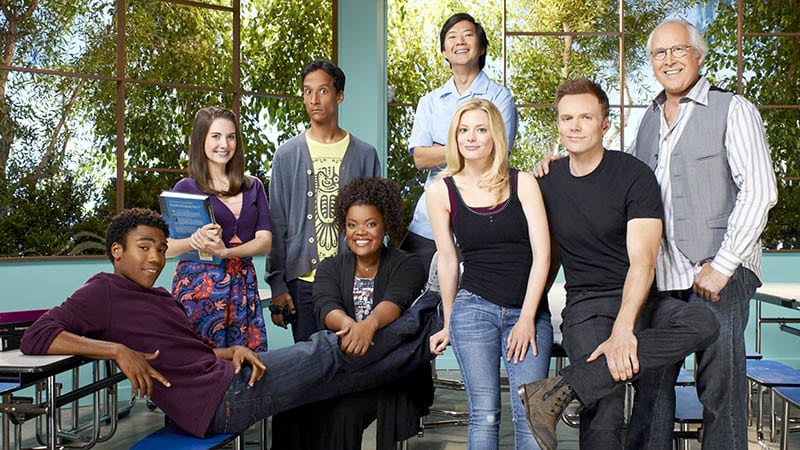The TV show Community featured lots of laughs, but it did so with a truly touching and American-centric message of acceptance, togetherness, and diversity.
Okay, so we’re going to ignore the later seasons that… lost their way. I’m talking from the show’s inception to what, arguably, should have been it’s finale. Also known as season 1 through season 3.
Premise: Community in the Beginning
Community began as a fairly cookie-cutter sitcom on NBC.
His fake degree finally exposed, main character Jeff Winger (Joel McHale) finds himself forced to return to school. Winger, a man who has built up an aloof persona, is obsessed with his own ego, and was making a successful life solely through bullshitting his way through everything, is now brought down several notches.
During his time at this community college, he develops an attraction to another student, Britta Perry (Gillian Jacobs). He decides to do what it takes to make her the next notch in his belt.
Once again relying on his only real talent, lying, he pretends to want to study Spanish with Britta. Only to end up in an actual study group.
This group slowly begins to become its own community.
Community’s Characters: One Big Melting Pot
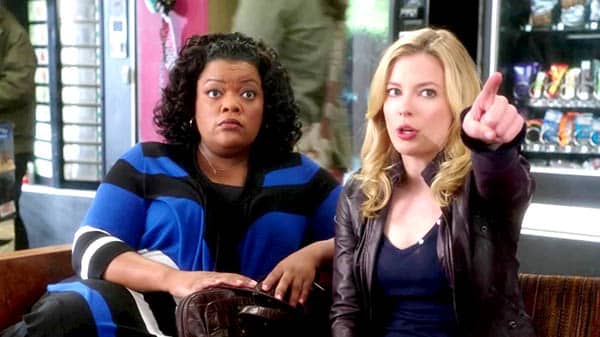
Everyone in this group brings their own set of strengths, neurosis, tragic backgrounds, and quirks.
You have Britta Perry, a tryhard that even Tumblr might find a little overt in her never ending quest to be contrarian and the most “woke.”
Annie Edison (Alison Brie), a young, brilliant, and tightly wound girl who lost her chance at a scholarship due to her adderall addiction.
Troy Barnes (Donald Glover) who, at the beginning of the series, is a lazy, wannabe cool guy who deliberately tanked his chance at a football scholarship because he simply had no idea what he wanted to do with his life.
Abed Nadir (Danny Pudi), someone who is definitely meant to read as having Aspergers, and who is completely obsessed with all things pop culture to the point it seems to be his whole identity.
Shirley Bennett (Yvette Nicole Brown), a passive aggressive, self-righteous, but ultimately loving mother who at the start of the series is trying to earn a degree to better support her children after her husband left her for another woman.
And finally, Pierce Hawthorne (Chevy Chase), a severely ignorant, callous, clueless older man who seems awfully attached to the study group despite declaring how little he cares.
What a diverse mix of people who come together to support each other based on the things they have in common, huh? Does it remind you of anything? I know, subtle, right?
Bonding Despite the Odds
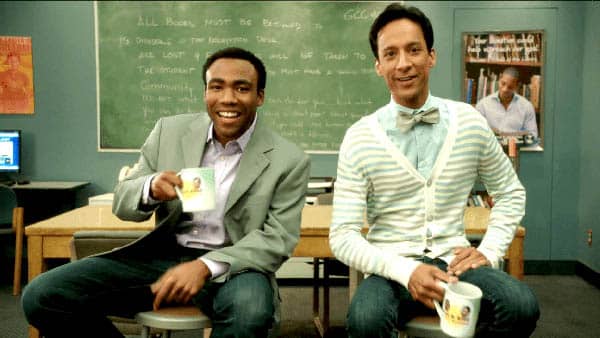
As the study group grows–both as individuals and as a collective–they become something far greater than the sum of their parts.
While the study group begins with a lie, something binds these characters together.
“Woke” Britta and “You need Jesus” Shirley shouldn’t have anything to do with each other, right? In this age, you would be completely cast out of your circle of politically correct, hot-take-article-writing friends to even associate with someone as openly religious as Shirley.
And Shirley, as vocally devout as can be, shouldn’t be friends with someone so “loose” and so indulgent in “the devil’s lettuce”.
Troy Barnes, a young, attractive jock who assuredly must be with only the coolest of kids, shouldn’t be anywhere near someone as odd and socially-baffling as Abed Nadir.
Nor should Abed even notice someone like Troy Barnes, since Troy is a real human and not something as easily digestible as a character in a movie.
On that note, why would Troy, a young African-American man, tolerate someone who is so loudly ignorant as Pierce?
And why would ever-driven Annie be any different from equally competitive, but altogether colder, Annie Kim (Irene Choi), a person who has no interest in others unless they can be used?
Why would any of these people not only spend time together, but also grow to care about each other?
Community’s United Theme
Community was about the American Dream.
There, I said it.
Or rather, what that dream would and should look like in a real, flawed world.
Not the spotless suburbs, two cars in every garage, and every person aiming to be a millionaire one day. No, the dream that a bunch of weird and damaged folks could build something together and actually learn to care about people that are so different about them.
And no, for the cynics in the audience, this doesn’t mean ignoring the extremes in our world. Yeah, at the end of the day, there are people who are too awful to ever really integrate into our society.
No one is saying you should invite a klansmen or eco-terrorist over for a game of Pictionary.
However, maybe we don’t have to close our minds off to the possibility of seeing flawed humans as humans.
Or ignore the potential for those people to be something greater.
A Community for Millennials
Community was also the right show for Millennials and all those feeling the sting of a waning economy.
For my generation, college was not a guarantee. For so many, when you graduated from high school, you neither had a scholarship or oodles of parent’s money waiting for you after you left the stage.
Instead, you got a job, and you went to community college.
And in Community, they presented a rather radical idea: Maybe you can still be happy.
Rather than be miserable because you didn’t hit all the typical markers of success, rather than keep your head ducked in shame, what if you made the best of a less than ideal situation?
What if you elevated it? Not to perfection, ever unattainable, but to a better place than it was before? What if you grew as a person, and not just as a resume?
Study Buddies, Study Thyself
Enter the iconic Study Group.
Annie, who found out that destroying herself in pursuit of academic and career achievement wasn’t the only way to be happy.
Troy, who realized that when he both embraced his inner weirdo and admitted he didn’t know where he was going in life, was able to find not only an intensely fulfilling friendship, but peace and the chance to become who he really wanted to be.
Shirley, who came to see herself more than just a vessel for the needs of others after spending time with more liberated people.
Britta, who learned that morality isn’t a club to wield or a shiny trophy to receive, got to experience life as her more authentic (and far less confrontational) self.
Abed, who became more integrated with the real world, understood that the give and take of real relationships is far more rewarding than living through entertainment alone.
Pierce, who was able to slowly drop his needlessly obnoxious facade and see others as they really are, finally gained real friends who accepted him.
Jeff Winger’s Transformation
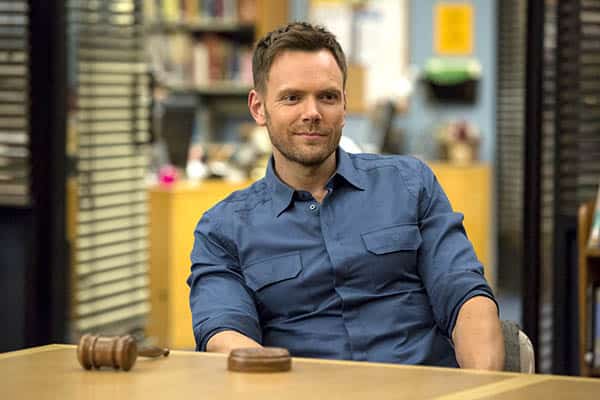
And, finally, Jeff Winger.
Jeff is the symbol for the deep-seated, oft excused selfishness in all of us. For our inherent greed.
He’s also a great example of how disgustingly clever we can be when it comes to arguing our way to victory. Regardless of whether we’re right or wrong.
Jeff is the part of us that doesn’t want to try. Because it’s either difficult or because we wonder, “What’s in it for me?” And he’s the part of us that thinks that to show vulnerability is to invite disaster and pain.
At the start of the series, we find him humiliated, angry, and desperate for a way out of something he sees so beneath him. He views Greendale as purely a means to an end. As the show goes on, the facade softens.
There are moments of true humility, empathy, and something more. He realizes that material things, fake friends, and empty praise will not fulfill him.
He begins to slowly confront the things that he has run from his entire adult life. And every single person in the study group helps him get there.
Yes, even Pierce.
That’s So Me
Everyone in the audience can find something relatable in at least one of the characters.
The show seemed almost tailor made to give every viewer their own avatar.
Annie
In Annie, you could see your own naivety and frustration at a lack acknowledgement. Your desire to succeed even when it seems the whole world is working against you.
Shirley
In Shirley, you could see your struggle with stepping outside of rigid beliefs and a desire to have an identity that is wholly yours.
Britta
In Britta, an exaggerated mirror to reflect your sometimes phony righteousness and reflexive “well, actually” tendences.
Pierce
In Pierce, the walls you put up to feel better than (and safe from) others.
Abed
In Abed, you could see your own need to cultivate an identity outside of fandom and to mature.
Troy
In Troy, a need to be truly honest with yourself about your weirder interests and about your own lack of ambition.
Jeff
And in Jeff, the need to care.
Bridging the Divide
It’s very easy to get to a place that seems like you can never return from.
Without going too deep into this, our current political landscape is like two teams fighting over a single, blight-riddled tree whilst trampling, completely oblivious, on a field of delicate saplings.
And also while whole villages around them burn to the ground… The need to simply score more “points,” to land a hit on the “other guys,” has become far more important than actually achieving anything of substance.
It’s like Lord of the Flies. Things degrade to such a point where you forget who you even were before.
I’m not saying that Community is the search and rescue party. Landing on the shore to untangle the bloody mess created by the savages that are us. But maybe it can at least inspire us a bit.
C-C-C-Changes
None of the characters on that show anticipated the changes that would come into their lives once they entered Greendale.
None of us thinks life will take us in the places it does.
As I reflect on the show many years later, I think about whether anyone else sees what I saw. Community was a hilarious show with a fantastic ensemble cast and a penchant for great parodies. But it was also so full of hope.
The characters, damaged and disparate as they were, all helped each other in untold ways.
Abed’s Uncontrollable Christmas
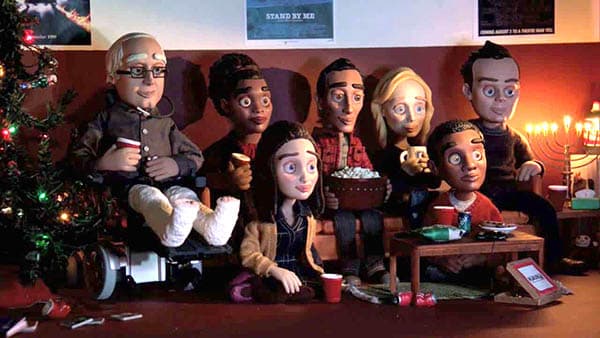
Perhaps there’s no greater example to use than the episode “Abed’s Uncontrollable Christmas.”
Synopsis: Abed’s Uncontrollable Christmas
It’s holiday time at Greendale, and Abed has a mental breakdown!
As expected, he turns to his one and only way of processing reality: abandoning it for something pop culture-related. He imagines the world in stop motion and it becomes clear to the study group that something must be done.
Everyone in the study group transforms into a surprisingly on-point representation of their inner demons.
Shirley
Shirley the “Christmas baby” is a perfectly hilarious representation of the non-stop whining of majority groups such as over-reactive Christians who think that having slightly less domination over the cultural landscape (think: the “Happy Holidays” retail debate) is nothing short of a horrible tragedy.
Jeff
Jeff-in-the-box cuts right through Winger’s carefully crafted cool-guy persona to what show creator Dan Harmon described as a “big talking head with limited practical functionality.”
Annie
Annie, while a beautiful ballerina, can certainly be interpreted as delicate and high-strung (that documentary about Russian children ballerinas was one of the most joyless things I’ve ever watched).
Britta
Britta, always trying to convey an aura of progressivism and aloofness, sees herself depicted as a cold, unfeeling robot that can’t form attachments with others.
Troy
Troy Barnes, a toy soldier, is someone who has spent quite a bit of his life going through the motions based on the expectations of others (simply swap out his military uniform for a letterman jacket).
Pierce
And finally, cantankerous and ignorant Pierce is depicted as a teddy bear, as he’s someone who could perhaps do with–and definitely desires–a little more love than he’s accustomed to (also having his “power” as a white, wealthy male reduced to a form that is huggably soft and far from intimidating).
Crisis Intervention 101
And though absolutely none of them are adequately trained psychologists, they do their best to coax Abed down from a metaphorical clay edge. By reminding him that he does have family, just not the one he is familiar with.
The episode ends with them stealing assorted holiday items from Greendale’s designated “holiday zone.” Greendale serving as a fantastic representation for the hyper wary, inefficient, and ham fisted way that we as a society handle any potential problem such as “scary” diversity. And they gather in front of the TV to spend some quality time together.
It’s as touching as it is hilarious.
Christmas Revelations
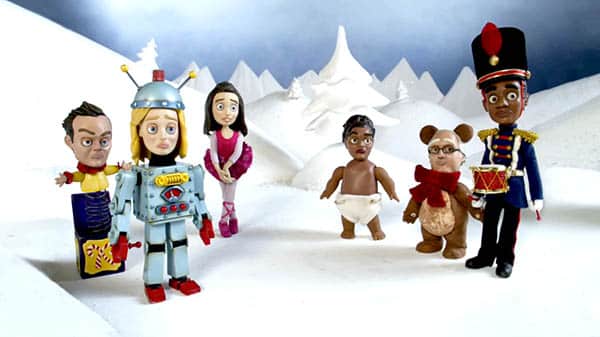
Every single character receives what should be a revelatory comment on their character.
Faults Exposed
Shirley is called out for her passive-aggressive behavior and holier-than-thou bellyaching.
Jeff finds himself “destroyed” by his own apathy, and no one in the group is moved by his posturing.
Annie, delighted with her supposedly beautiful and graceful depiction, is brought back to earth (you can literally hear her tightly wound springs twanging) with a comment on her type A personality.
And so on.
Better Together
Every character benefits from having a relationship with someone so different from them. Imagine if they had all remained in homogeneous peer groups.
Shirley
Shirley’s self-righteousness would get constant reinforcement from other privileged people with martyr complexes. Topped with continuing to view herself as only a domestic helper.
Jeff
Jeff would continue along as a phony blow-hard completely disconnected from real intimacy or even a semblance of morality. Only to have a complete mental collapse when his charm begins to fade.
Annie
Annie would have likely snapped under the pressure of constantly out-performing in a group of equally high-strung academics.
Britta
Britta would find herself surrounded by insincere PC crusaders and continue to erect a wall around her fragile heart. Leading to her never discovering (comparatively) healthy relationships.
Troy
Troy would likely have never discovered who he really is or explored other paths. Ending up just another disillusioned former jock with nothing but memories of his prime and likely a pile of concussions.
Pierce
Pierce would have been even worse of a person, eventually driving everyone away from him. Only to reinforce his curmudgeonly world-view. Leaving him to one day become a overlooked, dessicated corpse in his empty mansion.
Abed
And poor Abed, such a great expy for modern fans, would have dissolved completely into unreality, never having a real life or personality of his own (not to mention bankrupting himself and his father as his irresponsibility would have gone totally unchecked).
Balance through diversity.
A Microcosm of the Show’s Message
This episode is also a perfect demonstration of the core message of the show: Hey, things are kind of rough right now, but we’re together on this so let’s do the best we can.
Our U.S. Community (ca. 2020)
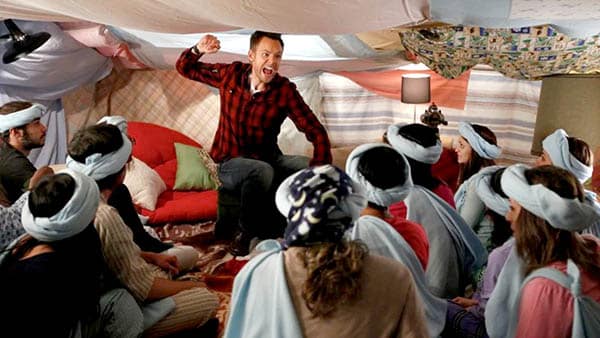
Right now, we’re in a bad place. Let’s not mince words. We’ve never been more fatalistic.
Between having to redefine what a successful life path even looks like, to beginning to feel the cold absence of real socialization in pursuit of electronic diversions, to wondering if we’re even allowed to speak to someone of certain political leanings, it appears we’re at a crossroads.
I think most of us assumed that once we made the transition from childhood to adulthood, we would be done with radical changes. To find out that, instead, there are even more times of great upheaval in our lives feels like nothing short of being cheated.
But to have something, anything, that not only acknowledges it, but suggests that this upheaval can lead to better things? It’s quite comforting indeed.
And to also have a show that depicts flawed people as neither being irredeemable nor changing completely in one special episode is absolutely refreshing.
School of Pop Culture
I’m not saying that pop culture can replace academics. However, it can certainly be an entry point for people who would otherwise have no interest.
And, it can make highly difficult or charged topics far more digestible.
Every single “woke” person chortled smugly to themselves when Joe Biden said that watching Will & Grace helped him understand LGBT people a bit better. But you know what?
It worked.
For him, the show gave the issue of gay rights a human face, and it got him thinking. Who cares if it wasn’t a highly polished essay in some prestigious journal?
I believe that Community could easily be reexamined by not only a generation of world-weary Millennials, but perhaps even people who never wander out of the land of QVC and conservative news outlets.
It was a show that had scooped out a perfect little slice of American life. Specifically, the parts that just weren’t working. And it showed that even with a completely mismatched group of people, something beautiful could come from it.
And I don’t know about you, but that’s something I find pretty inspiring.
In Closing

So, keep your talking heads and clickbait titles that are tailor-made to angry up my blood.
I have no interest in patting you on the back for posting your “brave” thoughts in what you know is an echo chamber.
I could give absolutely no craps about who was “slammed” or “destroyed” on Twitter this week.
I’d much rather have unique storytelling that encourages me to rethink how I view and treat the people who are different than me. It may not be To Kill a Mockingbird, but it’s still worth talking about.
One of the show’s stars, Donald Glover, really had it figured out.
To really get people thinking, you don’t just tell them what to think, you give them something that inspires them to.
